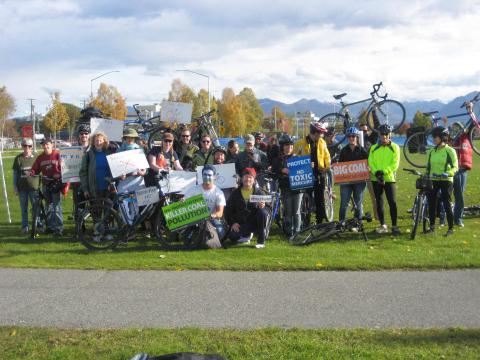By: Emily Fehrenbacher
Anchorage Moving Planet with the beautiful Chugach Mountains in the background

On a beautiful autumn day in Anchorage, Alaska, about 50 people took part in the first worldwide day of action called Moving Planet. Sponsored internationally by 350.org, and locally by the Sierra Club and Alaska Center for the Environment, Moving Planet is a call to action to move beyond fossil fuels so we can seriously address climate change.
Alaska is a unique place for an event like this: with close to 90% of state revenue coming from the oil industry and 1/8 of the world’s coal lying in our borders, it’s a hard conversation to have with the leadership of Alaska.
There are currently dozens of massive proposed mines, off- and on-shore oil and gas development and fossil fuel generated power plants on the table. For this one day, we chose to focus on two projects in Alaska that threaten wildlife, people and the climate.
First, everyone knows about the congressional attempts to open the Arctic National Wildlife Refuge—it’s a move based in politics above all else. At the same time Congress battles over those politics, the managers of the Refuge are listening to the public more than they ever have. The U.S. Fish and Wildlife Service is updating their management plan for the Refuge called the Comprehensive Conservation Plan. Because millions of Americans have fought to protect the Arctic Refuge from oil drilling, this plan for the first time ever considers a wilderness designation for the coastal plain of the Refuge—the area most threatened by Big Oil. This would finally put an end to a 50-year long fight to protect the wildlife and local communities. We collected public comments for this planning period, and with each comment we get closer to keeping that oil in the ground.
Our other action was around a project just up the road from Anchorage where Usibelli Coal Company seeks to build a coal strip mine in the middle of a residential community. The Wishbone Hill project would is currently being re-permitted through the Alaska Department of Natural Resources despite widespread public opposition to the project. Hundreds of families live within just one mile of the proposed mine, and thousands will be impacted by the transport of the coal when it is on the road, aboard a train, and then shipped to Asia. Moving Planet participants submitted formal comments to the Alaska DNR asking them to deny Usibelli’s current mining permit. We need to protect our communities from the toxic processes of coal mining to ensure clean air, water, and healthy families.
Emily Fehrenbacher explains the three proposed coal mines in the Matnauska Valley while at Elderberry Park
The local television station and local paper, the Mat-Su Frontiersman, gave us a platform to advocate for these issues beyond the event. The best part was the people who attended.
4 A Moving Planet Volunteering gets into the Spirit
One woman found out about the event because her friend was hosting the South Africa Moving Planet. Farmers from the South Anchorage Farmers Market donated delicious local vegetables, the Moose’s Tooth donated pizza, and Skinny Raven and REI donated gifts.
Moving Planet gave us a chance to reach out to Anchorage about the most imminent fossil fuel development threats to an audience that cares deeply about the future of Alaska, and have fun while doing it.
Article